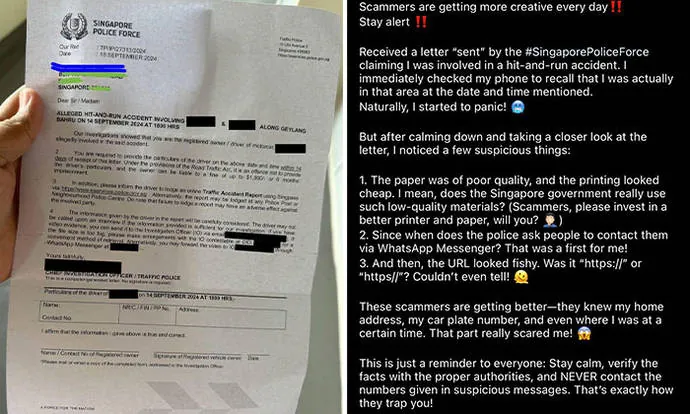
Car Owner Mistakenly Believes Traffic Police's Hit-and-Run Letter is a Scam—What You Need to Know!
2024-10-04
Introduction
Recently, a car owner in Singapore found himself in a perplexing situation after receiving an official letter from the Traffic Police (TP) concerning a potential hit-and-run incident involving his vehicle. The case has sparked significant discussion online, raising important questions about what to do when faced with unexpected communications from authorities.
Details of the Incident
The letter pertained to an alleged hit-and-run that occurred on September 14 in Geylang Bahru around 6 PM. It prompted the vehicle owner to identify who had been driving his car during that time. Ignoring this request could lead to serious consequences, including a fine of up to $1,000 or even a six-month jail term. The correspondence provided contact details for the investigating officer, including a phone number and a WhatsApp contact.
Concerns Raised
However, the vehicle owner shared concerns on social media, suspecting that the communication might have been a sophisticated scam. He noted the letter's "poor quality" and "cheap" appearance, questioning the legitimacy of the police's request for a WhatsApp contact—something he deemed unusual.
Personal Information Anxiety
Adding to his anxiety, he mentioned how the sender seemed to have detailed personal information about him, including his home address, license plate number, and whereabouts at a particular time, which added to his unease. "These scammers are getting better," he expressed, highlighting the chilling implications of someone possessing such intimate knowledge.
Verification and Reminder
Fortunately, an independent verification by Stomp confirmed the authenticity of the letter, setting the record straight. It serves as a critical reminder of the importance of evaluating official communications thoughtfully. The police emphasize the need to be vigilant and verify the legitimacy of such letters before dismissing them as scams.
Conclusion and Recommendations
In light of this incident, it is valuable for citizens to remain informed and equipped with the right resources to differentiate between actual scams and genuine communications. The authorities recommend using tools like the ScamShield WhatsApp bot for verification and guidance.
So the next time you receive an unexpected letter from the traffic police, don’t rush to dismiss it as a scam—take a moment to verify and ensure you're not caught in a miscommunication trap! Stay safe and informed!





 Brasil (PT)
Brasil (PT)
 Canada (EN)
Canada (EN)
 Chile (ES)
Chile (ES)
 España (ES)
España (ES)
 France (FR)
France (FR)
 Hong Kong (EN)
Hong Kong (EN)
 Italia (IT)
Italia (IT)
 日本 (JA)
日本 (JA)
 Magyarország (HU)
Magyarország (HU)
 Norge (NO)
Norge (NO)
 Polska (PL)
Polska (PL)
 Schweiz (DE)
Schweiz (DE)
 Singapore (EN)
Singapore (EN)
 Sverige (SV)
Sverige (SV)
 Suomi (FI)
Suomi (FI)
 Türkiye (TR)
Türkiye (TR)